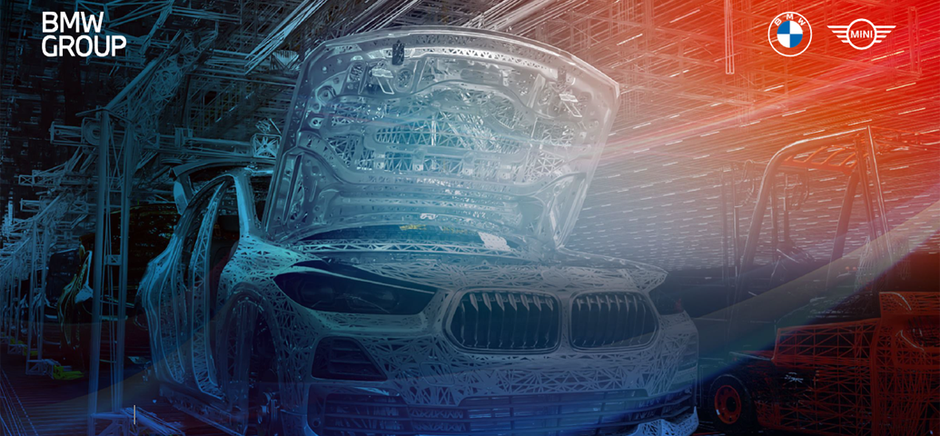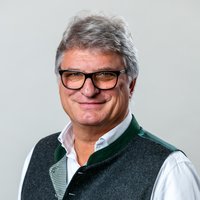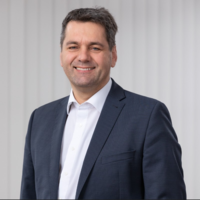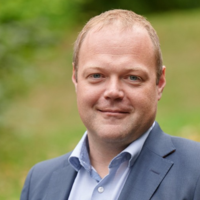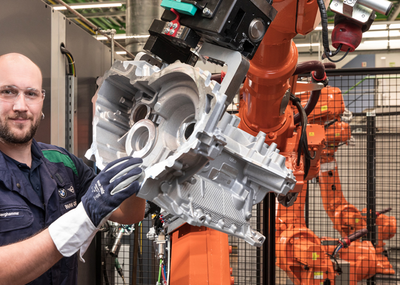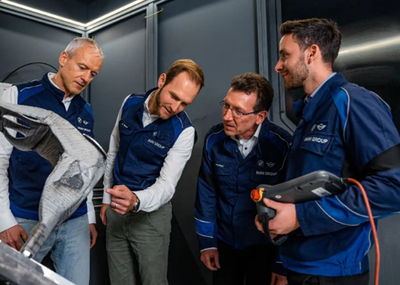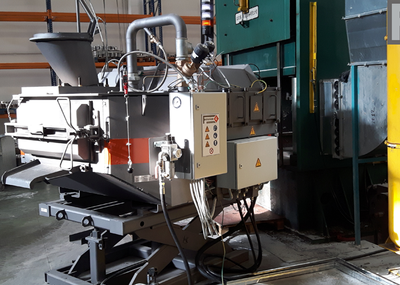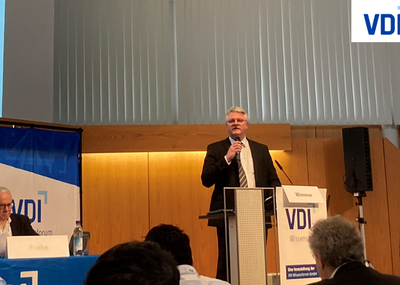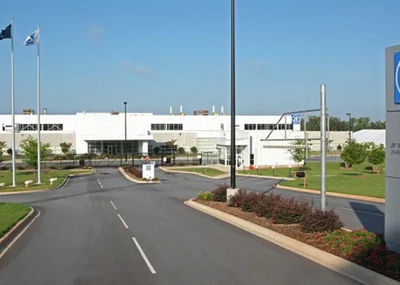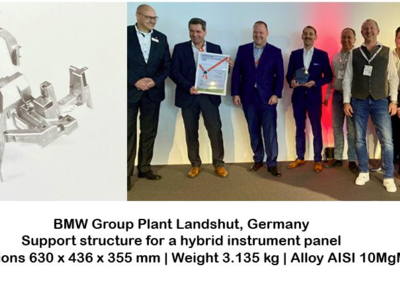Like all leading car manufacturers worldwide, the Bavarian premium manufacturer BMW in Landshut has been exploring the advantages and disadvantages of so-called giga or mega castings for some time. Tesla attracted a lot of attention with the introduction of large die-cast parts for its vehicle structure, such as the rear underbody structure of the Model Y.
This requires die casting cells with a clamping force greater than 6,000 tons.
The approach of substituting as many individual parts and processes as possible with large castings and thus even reducing costs, weight and CO2 factors while simplifying the production process sounds tempting. On the other hand, there are high upfront investments in new systems and infrastructure, the reconfiguration of product lines and technical challenges related to the production and further use of the large parts.
During a background discussion with Klaus Sammer and Dr. Thomas Kopp at BMW's light metal foundry in Landshut, we were able to discuss the main arguments for and against large castings and gain insight into BMW`s specific point of view.
"There is no "right" or "wrong" answer to the giga/megacasting question
Kopp and Sammer are sought-after discussion partners at congresses and symposiums, as they have dealt intensively with the issues surrounding the production of large castings and are well aware of the advantages and disadvantages.
What is the situation at the BMW light metal foundry in Landshut, Germany in 2024?
The BMW Group light metal foundry in Landshut is a highly innovative location known for a wide and unique range of casting technologies. These include both conventional gravity and low-pressure die casting.
A notable technique ist the injector casting process, developed and patented by the casting specialists in Landshut in 2007. It combines the advantages of gravity and low-pressure die casting.
The process involves filling the cavity using an injector at the mold's base and moving it upwards during the casting. This ensures the outlet opening remains below the molten bath's surface throughout the filling process, leading to a layered mold filling beneficial for the solidification process. This method allows for the production of highly complex and functional components, such as the central housing of electric motors. The sand cores needed for creating undercuts are exclusively made with inorganic binder systems, resulting in virtually emission-free casting—a practice in place for over 15 years, as emphasized by Kopp and Sammer.
In addition to conventional core shooting, sand cores can also be produced at the Landshut site using additive core printing with inorganic binder systems. This ensures the future viability of the site.
In the area of die casting, the facility operates ten systems with clamping forces ranging from 3,000 to 6,000 tons. Strong arguments exist for using die casting cells with clamping forces over 6,000 tons, potentially up to 16,000 tons, as the decision heavily depends on the specific production process requirements, site conditions (e.g., material flow/logistics), and company standards and objectives.
The substitution of sheet metal components with cast components can eliminate numerous manufacturing and assembly steps. For instance, the suspension strut support replaces about 15 components, though its lightweight construction potential is relatively low due to the small number of substituted components. Strut braces are made on die casting machines with a clamping force of 2,000 to 3,000 tons, while rear longitudinal members, which offer a higher degree of substitution and greater lightweight potential, require larger machines of about 4,000 tons.
If the aim is to substitute as many components as possible, the one-piece rear end is the right choice. Here, 80 to 100 components can be substituted. These so-called gigacastings are produced on systems with a clamping force of more than 8,000 tons. However, this is not necessarily the solution with the greatest lightweight construction potential. In order to be able to produce the component by die casting, the sheet metal surfaces shown in red in the diagram below, such as the trunk floor or the wheel arches, must have a certain minimum wall thickness. This is often greater than the wall thickness required by the loads and therefore increases the overall weight of the components. The additional weight is also accompanied by higher material costs, as the expensive lightweight material aluminum is used in areas that could also be represented by a thinner, e.g. formed sheet metal component.
It will be crucial to use the right material with the right manufacturing process in the right place (topology-optimized). The sweet spot of weight and degree of substitution is seen in components that are produced on die casting machines between 4,000 t and 6,000 t.
Moreover, while evaluating lightweight potential, other factors such as the requirements for heat treatment and the availability of repair solutions, which are limited for large castings and often costly, must be considered. Logistic costs also rise with increasing component size, suggesting that the foundry might need to integrate more closely with the vehicle plant to justify investment in new die casting systems. The number of systems required largely depends on the vehicle plant's output and the number of variants per line. Several die casting machines are often necessary to ensure a reliable supply to the vehicle line. Due to the large size of components, increased tool wear is expected, leading to more frequent maintenance and a higher number of tools required.
It should be noted that there are currently no compelling advantages for using casting cells with a clamping force greater than 6,000 tons at BMW. The BMW component plant in Landshut operates with a strong supplier network, ensuring the supply to the vehicle plants. At BMW, the focus is more on achieving optimal results with innovations and a great deal of expertise while casting the right material in the right place using the right process.
About BMW Landshut:
At BMW Group Plant Landshut, approximately 3,700 employees produce engine, chassis and body structure components from light metal casting, plastic components for vehicle exteriors, carbon body components, cockpit and equipment scopes, engines and drive shafts. The Landshut plant is the BMW Group's largest component plant worldwide and supplies components to all BMW Group vehicle and engine plants worldwide - and thus for almost every BMW, MINI, Rolls-Royce and BMW Motorrad. The BMW Group Plant Landshut stands for component production characterized by digitalization and sustainability as well as responsible use of resources.
With future-oriented technologies, the BMW Group Plant Landshut plays the role of an innovation driver in the technological transformation of the automotive sector and its supplier industry. At the Lightweight Construction and Technology Center (LuTZ), which is directly connected to the plant, specialists from a wide range of disciplines actively drive the sustainable development of future vehicle models. They are involved in the development processes of new vehicles at an early stage. The BMW Group Plant Landshut is a socially responsible, innovative and attractive employer in the Landshut and Lower Bavaria region.
About Dr. Thomas Kopp and Klaus Sammer
Klaus Sammer has been part of the BMW Group since 1985 and was most recently Head of Planning for Painted Bodywork at the Dingolfing plant and, from 2018 to 2021, Head of Painted Bodywork for the plant under construction in Debrecen (Hungary). He then took over the management of product and process planning for the light metal foundry at the BMW Group plant in Landshut. In addition to his duties in the BMW Group, Sammer is also a member of the advisory boards of various associations.
2001 to 2005: Project Manager - Plant Munich BMW
2005 to 2011: Team Lead Research Development - Plant Munich BMW
2011 to 2015: Head of the department for assembly and total vehicle validation - Plant Munich BMW
2015 to 2018: Head of Planning Body Shop - Plant Dingolfing BMW
2018 to 2021: General Manager Pressshop and Bodyshop - Plant Debrecen BMW
2021 to 2023: Head of Technology Center Foundry, Plant Train Construction, Maintenance and Prototype Construction as well as Product & Process Planning - Plant Landshut
Dr. Thomas Kopp has been with the BMW Group since completing his doctorate in 2016. He is currently responsible for the further development of innovative cast components for future vehicles as Team Coordinator Advanced Development in the Light Metal Casting Technology Center. Previous positions include sub-project manager for production and team leader for quality in gravity and low-pressure casting. In addition to his work at the BMW Group, Dr. Thomas Kopp is also a member of the advisory boards of various associations.

